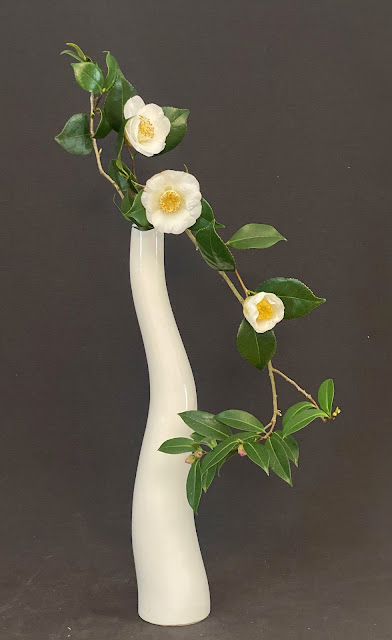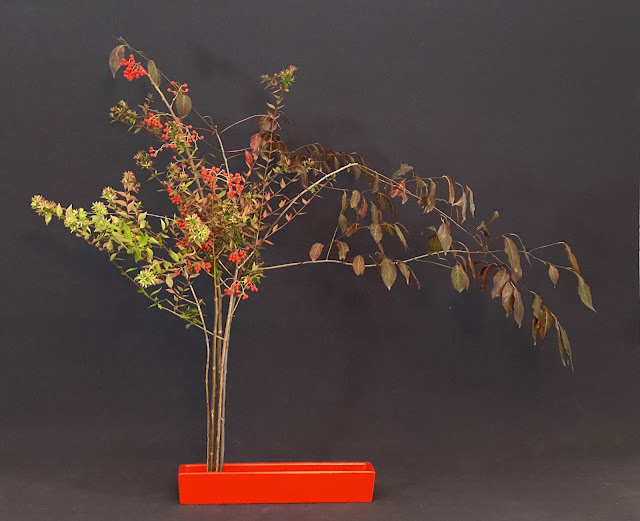Hello all,
Well our exhibition in currently on at the All Nations Foyer at Box Hill Town Hall commemorating my 20 years of teaching. We have 24 arrangements varying in sizes and styles. So far it has been very well received. I will share photographs of our exhibits in future posts.
As part of our celebrations I conducted a demonstration on Saturday with the help of three of my advanced students - Lucy, Vicky and Cym. Jenny was also going to take part, but, unfortunately, she had a nasty fall a few days before and had to withdraw.
The pond arrangement, above, was one of my demonstration pieces. I made the container specifically for this type of arrangement. I had used crushed glass in blues and greens, which, when fired, melted and created a glaze that resembles water. I used driftwood, Dutch iris, umbrella grass and Japanese maple.Vicky used a cheeky, ceramic container into which she placed a piece of kiwi vine coloured dark blue and blue disbud chrysanthemums and yellow chrysanthemum indicum. Her theme was 'Colours in Contrast'.
Lucy wanted to make a celebratory arrangement in honour of the occasion. She used a container that is mostly suited to Ikenobo style of ikebana. The dried and sprayed gold and silver agapanthus had been trained to have interesting curves and give the impression of fire works. She added crucifix orchids to the 'fireworks' and some dietes leaves and a single anthurium leaf, whilst being careful not to clutter the lines at the base.
Cym used her self made, nageire container with a 'window' opening to one side. She added twisted willow and corokia to enclose a space, then kangaroo paw and hydrangeas to complete a light and airy piece.
I usually start demonstrations with a Basic Upright arrangement, which is the very first lesson on our curriculum. However, because we had an example of this in our exhibition, I started with a 'Simplified Arrangement' instead.In this exercise we trim the material, removing all but its most basic elements. I found a beautiful camelia and chose a small, black, glass vase to place it in. However the camellia was facing downwards, so I manipulated it until it succumbed and stayed the way I wanted.
I then wanted to use a gorgeous pomegranate that had begun to split. I'd been keeping an eye on it, hoping it would not be eaten before I could use it. The split revealed seeds that sparkled like rubies.
 |
| Close up of fruit with seeds |
I was walking through the park with my grandchildren, going to the NGV when I found this palm spathe. I told the children to remind me to pick it up on the way back and, bless them, they did.
I wanted to demonstrate how I secured it outside the vase. It's a relatively simple method of wedging a horizontal fixture at the top of the vase and, after piercing a small hole in the back of the spathe, I wired it to the horizontal fixture. When looking for other material to use with this structure, the cathedral begonia practically called to me. I love the combination of green and brown but, also, the frilly form of the leaves.
This next, simple arrangement is an example of of the lesson 'Disassembling and Rearranging the Material'. I used a birds nest fern, from which I cut away the leaf parts on both sides and left only the spine. I then placed the leaf of one side into a curved container, making sure to create asymmetry with the frills and then added the spine as the line of the arrangement.

My student, Dianne, produces the most amazingly healthy plants in her prolific garden. We're all in awe of the materials she brings to class. But, apart from being a consummate gardener, she is also very generous and often arrives with a lot more materials than she needs with the intent of sharing them with the class. Last class was a case in point when she brought a whole bucket full of huge, luscious, white chrysanthemums. I used a couple of stems in my demonstration piece of the lesson 'Mass and Line'. Because of their weight, the flowers grew hanging downwards, making them difficult to use, so I had to get creative. I placed the stems in one of the lower holes of this large container and then draped the flowers at the top.
And the final arrangement was of the lesson 'Glass Containers', in which we can use only the inside of the container or both the inside and outside. I've done the latter. I used clear perspex to hold up one side of the agave pieces to create the illusion.
Emily






































